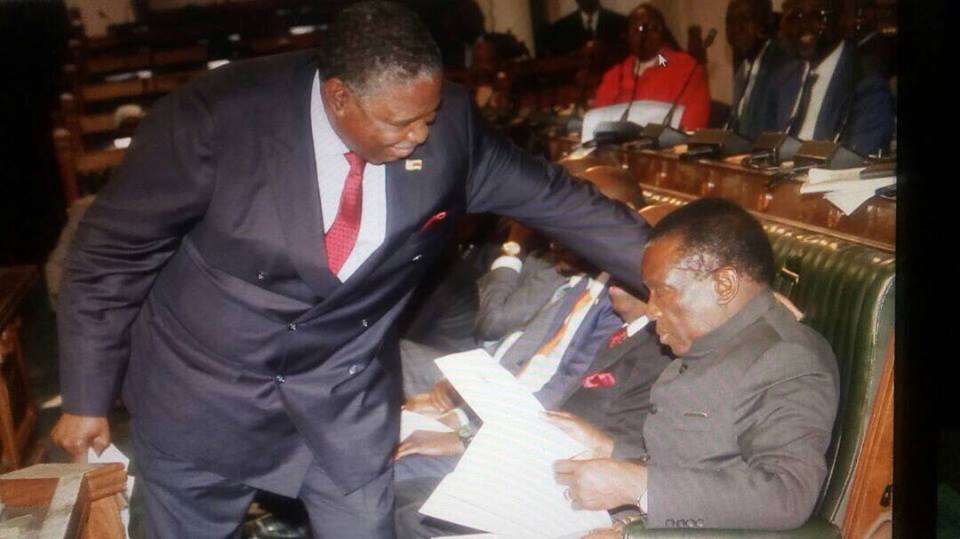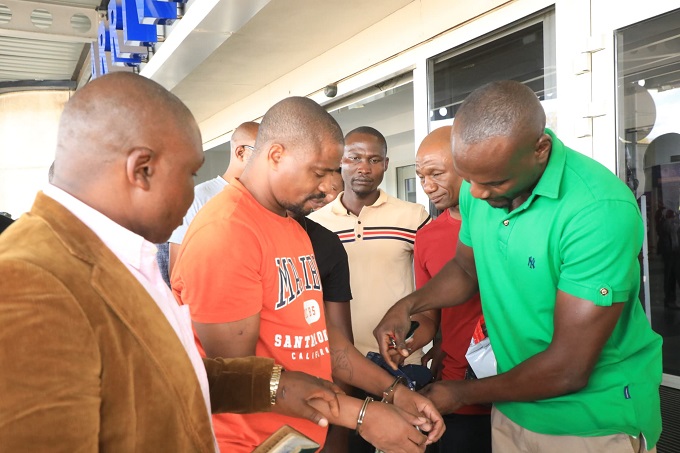PRESIDENT Emmerson Mnangagwa’s administration is gunning for ex-vice-president Phelekezela Mphoko after picking up intelligence that he is reportedly working with some senior Zanu PF officials linked to ailing Vice-President Constantino Chiwenga and remnants of the ruling party’s spooky G40 faction to launch a court application challenging Mnangagwa’s legitimacy.
By Owen Gagare
Security sources said Mphoko is also being hounded over his former shareholding in supermarket chain Choppies — seen as the source for a war chest to fund the application and the renewed power struggles.
He is also being hunted down over his role as former president Robert Mugabe’s point man to investigate a series of alleged crimes against Mnangagwa which include the late Godfrey Majonga’s forced crippling plunge from a high-rise flat saga, the mysterious death of a Harare woman and the Kwekwe gold mining wars and associated deaths.

The court challenge, security officials said, was meant to be premised around the contestation that Mnangagwa was unconstitutionally and unprocedurally appointed president after the November 2017 military coup which toppled former president Robert Mugabe.
The application was not going to challenge the coup per se, but argue that the constitution was not followed after Mugabe’s ouster.
The revelation comes at a time it has emerged Mugabe’s resignation letter has disappeared from parliament. Sources said this was connected to the planned court battle.
As revealed by the Zimbabwe Independent last week, a senior official in the Parliament of Zimbabwe, assistant clerk Johannes Gandiwa, who was entrusted with custody of Mugabe’s resignation letter, has been dismissed from work for gross negligence after the history-making document disappeared under his watch.
Mugabe resigned under pressure from the military on November 21, 2017, bringing an end to his controversial 37-year rule, although Chief Justice Luke Malaba later ruled he quit voluntarily. The letter, which vanished, says he left voluntarily.
His resignation letter, a culmination of a week of sustained military pressure and street demonstrations, was read out by Speaker of the National Assembly Jacob Mudenda as parliament was in the process of initiating an impeachment motion against him.
Mnangagwa was then appointed president by Zanu PF before taking over the country.
Mphoko and his allies were said to be preparing to contest how Mnangagwa came in.
Part 4 of the Sixth Schedule Section 14 sub-paragraph 4 of the constitution, which provides a special provision for the election and tenure of president and appointment of vice-presidents, says “if the person elected president in any election referred to subparagraph (1) dies, resigns and is removed from office (a) the vice-president or, where there are two vice-presidents, the vice-president who was last nominated to act in terms of subparagraph (3)(b) acts as president until a new president assumes office in terms of subparagraph (5)”.
Mphoko was the only vice-president when the coup occurred following the firing of Mnangagwa by Mugabe two weeks earlier.
Sub-paragraph 4(b) states that “the vacancy in the office of the president must be filled by a nominee of the political party which the president represented when he or she stood for election”.
Sub-paragraph 5 says: “A political party which is entitled to nominate a person in terms of subparagraph (4)(b) must notify the Speaker of the nominee’s name within 90 days after which the vacancy occurred in the office of the president, and thereupon the nominee assumes office as president after taking the oath of president in terms of Section 94, which oath the nominee must take within 48 hours after the Speaker was notified of his or her name.”
Security sources say Mphoko was going to argue that Mnangagwa was not vice-president when Mugabe was removed and therefore he could not immediately come in from outside as required by the constitution and law, even though Zanu PF later held a meeting to reinstate him and then install him as president. The sources say Mphoko was going to contest the constitutionality and procedure of that process on those grounds.
Mnangagwa has been battling legitimacy questions since he came in; first the coup issue, then the disputed election matter and now Mphoko’s planned challenge. His legitimacy also came under close scrutiny on August 1, 2018 when the military shot and killed six people in the streets, before killing 17 more in January this year and after the police’s brutal crackdown on peaceful protestors in Harare last Friday.
“After information was obtained showing that Mphoko could launch the court challenge, a decision was made to get him so that he doesn’t become a new headache and a rallying point,” a source said. “An easy way of getting rid of him was to arrest him for storming Avondale Police Station to free former Zimbabwe National Road Administration (Zinara) acting chief executive Moses Juma and non-executive director Davison Norupiri who were arrested in 2016 on allegations of defrauding the authority of US$1,3 million.”
Juma was last year jailed for an effective two years, while Norupiri was made an accomplice witness.
The Zimbabwe Anti-Corruption Commisison (Zacc) officers were then unleashed on Mphoko. They tried to seize him last week on Saturday from his Bulawayo home and fought battles with him on Monday when he escaped arrest.
Zacc claimed on Tuesday he was on the run and a wanted man even though he was at his house. He then appeared in court on Wednesday at the magistrates’ court on criminal abuse of office charges. He was remanded out on ZW$1 000 bail.
Security sources said Mphoko spoke to Mnangagwa by phone on Tuesday to ask why he was being hounded and plead with him to stop Zacc from pursuing him. The sources said Mnangagwa told him that he was not sure why Zacc was in hot pursuit of him, but refused to intervene in the matter.
Despite being co-vice-presidents under Mugabe, Mnangagwa and Mphoko had fractious and sometimes hostile relations which deteriorated after the coup.
In his battle to regain control of Choppies following boardroom squabbles at the company after he was ousted from the vice-presidency in the aftermath of the coup, Mphoko’s backers accused Mnangagwa of supporting their Botswana business rivals.
Sources said Mphoko was only paid ZW$400 000 — instead of US$400 000 — for his 7% equity stake after being kicked out of Choppies.
However, Mphoko insists he owned 51% of the business and was entitled to US$33 million. He also wanted to launch a court case over that.
Sources said Mnangagwa is also hunting down Mphoko because he was used as a blunt instrument by Mugabe to attack him at the height of his succession battles. Mphoko was superintending criminal investigations against Mnangagwa ordered by Mugabe. Mphoko worked closely with former Home Affairs minister Ignatius Chombo, before he was appointed Finance minister just before the coup, and former police commissioner-general Augustine Chihuri, sources say.
Police were investigating Mnangagwa over a series of allegations, including the murder of a Harare woman which his accusers implicated him in, his role in Kwekwe’s machete-driven gold wars and for allegedly forcing prominent journalist Majonga to jump from the second floor of a flat in the Avenues in Harare, leaving him crippled.
Majonga died in Harare this week.
Besides checkmating Mnangagwa, Mphoko also actively encouraged Mugabe to fire him. After Mnangagwa was sacked, forcing him to flee to South Africa through Mozambique, Mphoko urged Mugabe to appoint Grace as his co-vice-president, saying he was “lonely” as deputy at the top table.






